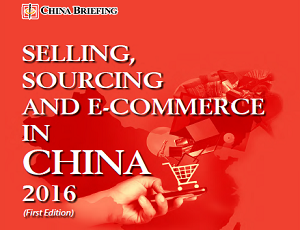Vietnam News Brief: New Investments in Airports, Tariffs on Steel, and Regulations for Female Employees
11/03/2015This edition of Vietnam Regulatory Brief covers changes in investment in Vietnam's airports, a new tariff on steel, and update labor regulations for female employees.
China Regulatory Brief: Incentives for Foreign-invested R&D Centers and the End of One-Child Policy in China
11/02/2015In this week's China Regulatory Brief, we take a closer look at the incentives offered to foreign-invested R&D centers in Shanghai, China's one-child policy, the new foreign investment rules in Beijing, and the housing fund contribution rules for foreign employees.
Selling, Sourcing and E-Commerce in China 2016 - New Publication from China Briefing
10/28/2015The latest publication from China Briefing, entitled Selling, Sourcing & E-Commerce in China 2016, is out now and available for purchase through the Asia Briefing Bookstore.
How to Hire Part Time Employees in China
10/16/2015Part time work is not as common in China as it is in the West. From a legal perspective, regulations are not very comprehensive or detailed. However, the labor market in China is dynamic, changing, and influential. Foreign companies may thus find themselves in situations where employing part-time workers is advantageous.
Import & Export in Vietnam: Key Industries & Free Trade Agreements
10/15/2015The new issue of Vietnam Briefing magazine, titled "Import & Export in Vietnam: Key Industries & Free Trade Agreements", is out now and available as a complimentary download in the Asia Briefing Bookstore.
Issuing Special Red-Letter Value-added Tax Invoices in China
10/06/2015Starting April 1, 2015, China has implemented an updated and improved Value-added Tax (VAT) Invoice Management System. In this article, we introduce China’s updated VAT invoices management system and walk investors through the procedure for handling the issuance of special red-letter VAT invoices in China.
Tax Incentives for High-tech Companies in China
09/29/2015Since China’s new Enterprise Income Tax Law took effect in January 2008, the country’s national and provincial governments have implemented a series of tax incentives for new high tech enterprises. In this article, we discuss the tax incentives for high-tech companies and certain criteria they must meet.
The Extension of Labor Contracts in China: Legal Responsibilities and Risk Management
09/22/2015It is important for foreign companies to be aware of the hidden perils behind continued employment without a contract. This article discusses the correct procedures to prevent any further risks when extending a labor contract in China.
China Regulatory Brief: Tax Registration Certificate to be Abolished, Updated Chinese Advertising Law
09/21/2015In this week's China Regulatory Brief, we discuss the updated 2015 Chinese Advertising Law, the abolishment of tax registration certificate for company registration starting October 1, Beijing's service industry opened up to foreign investors and rules for e-commerce platforms.
Outlook on Light Manufacturing in China: September 2015
09/07/2015With China’s recent move to devalue its currency, export-oriented manufacturers were granted a temporary cost advantage and are likely to see growth in order quantities from low-end retailers or receive requests for contract renegotiations.












